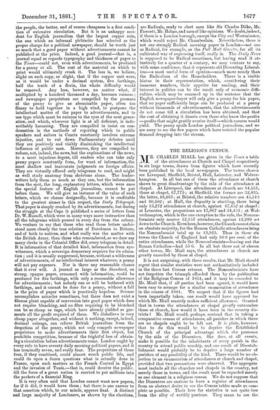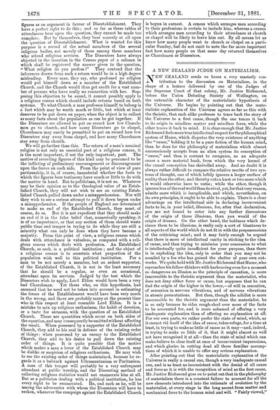THE RELIGIOUS CENSUS.
MR. CHARLES MIALL has given in the Times a table of the attendances at Church and Chapel respectively in six large towns, drawn from figures which have recently been published in the local newspapers. The towns chosen are Liverpool, Sheffield, Bristol, Hull, Leicester, and Wolver- hampton. In all but one of these the attendance at church shows to great disadvantage by the side of the attendance at chapel. At Liverpool, the attendances at church are 54,551, those at chapel, 67,775 ; at Sheffield, the former are 32,835, the latter, 48,463 ; at Bristol, the relative numbers are 45,513 and 60,502 ; at Hull, the disparity is startling, there being only 13,272 attendances at church, against 47,452 at chapel ; at Leicester, the proportions are 17,867 and 34,453 ; at Wol- verhampton, which is the one exception to the rule, the Noncon- formists only muster 12,157 attendances, against 12,289 set down to the Church. Even here, however, the Church cannot claim an absolute majority, for the Roman Catholic attendances bring the Nonconformist total up to 13,925. Thus in these six towns the Church of England had only 36.9 per cent. of the entire attendances, while the Nonconformists—leaving out the Roman Catholics—had 55.6. In all but three out of eleven other towns, Mr. Miall says, the attendances at church are greatly exceeded by those at chapel.
It is not surprising, with these results, that Mr. Miall should regret that similar statistics were not authoritatively included in the three last Census returns. The Nonconformists have not forgotten the triumph afforded them by the publication of the Religious Census of 1851, and it may be conceded to Mr. Miall that, if all parties had been agreed, it would have been easy to arrange for a similar enumeration of attendance in the census of 1881. We suspect that if the figures had been impartially taken, one result would have appeared for which Mr. Miall scarcely makes sufficient allowance. Granted that in towns the attendances at chapel greatly outnumber those at church, how would it have been in the country dis- tricts ? Mr. Miall would, perhaps, contend that in taking a comparative census of attendances, all parishes in which there are no chapels ought to be left out. It is plain, however, that to do this would be to deprive the Established Church of the principal advantage which she possesses by the side of the Dissenters. She does, at all events, make it possible for the inhabitants of every parish in the country to attend public worship, and one result of Disestab- lishment would probably be to deprive a large number of parishes of any possibility of the kind. There would be no ob- jection to an enumeration of attendances at church and chapel, provided that two precautions were observed. The aggregate must include all the churches and chapels in the country, not merely those in towns, and the result must be regarded merely as one element in a religious census. We do not suppose that the Dissenters are anxious to have a register of attendances from an abstract desire to see the Census tables made as com- plete as possible. Their love for statistics is not quite free from the alloy of earthly passions. They mean to use the
figures as an argument in favour of Diseatablishment. They have a perfect right to do this ; and so far as these tables of attendances bear upon the question, they cannot be made too complete. But by themselves, they bear scarcely at all upon the question of Disestablishment. What is wanted for this purpose is a record of the actual members of the several religious bodies, not merely of those among these members who attend religious services. The Dissenters have always objected to the insertion in the Census paper of a column in which shall be registered the answer given to the question, " What religion do you profess ?" They contend that the inferences drawn from such a return would be in a high degree misleading. Every man, they say, who professed no religion would put himself down as a member of the Established Church, and the Church would thus get credit for a vast num- ber of persons who have really no connection with her. Sup- posing this objection to be sound, it cannot possibly apply to a religious census which should include returns based on both systems. To what Church a man professes himself to belong is a fact which may be worth much or little, but which at least deserves to be put down on paper, when the object is to collect as many facts about the population as can be got together. If the Dissenters are allowed to put on record how few Church- men go to church, and how many Dissenters go to chapel, Churchmen may surely be permitted to put on record how few Dissenters stay away from chapel, and how many Churchmen stay away from church.
We will go farther than this. The return of a man's nominal religion is not only an essential part of a religious census, it is the most important, if not the only important, part. The motive of recording figures of this kind may be presumed to be the inflicting of preliminary encouragement or discouragement upon the forces on each side. From the point of view of pure partisanship, it is, of course, immaterial whether the facts to which the figures bear testimony have much or little to do with the matter in hand. But to politicians, it is not so. Whatever may be their opinion as to the theological value of an Estab- lished Church, they will not wish to see an existing Estab- lished Church pulled down under a misapprehension. Nor will they wish to see a serious attempt to pull it down begun under a misapprehension. If the people of England are determined to make an end of the Established Church, they must, of course, do so. But it is not expedient that they should make an end of it in the false belief that, numerically speaking, it is of no importance, or that any section of them should waste public time and temper in trying to do while they are still a minority what can only be done when they have become a majority. From this point of view, a religious census which deals with attendance is valueless, as compared with a reli- gious census which deals with profession. An Established Church, as such, is a political institution ; and the object of a religious census is to ascertain what proportion of the
population wish well to this political institution. For a man to be not merely a member, but an ardent supporter, of the Established Church, it is not in the least necessary that he should be a regular, or even an occasional, attendant upon its services. Judged by the test which the Dissenters wish to apply, Lord Eldon would have been a very bad Churchman. Yet those who, on this hypothesis, had assumed that he need not he taken into account in estimating the forces of the Establishment would have been very much in the wrong, and there are probably many at the present time who in this respect at least resemble Lord Eldon. It is a mistake to mix up religious enthusiasm, the habit of devotion, or a taste for sermons, with the question of an Established Church. These are quantities which occur on both sides of the equation, and may consequently be omitted without affecting the result. When possessed by a supporter of the Established Church, they add to his zeal in defence of the existing order of things ; when possessed by an enemy to the Established Church, they add to his desire to pull down the existing order of things. It is quite possible that the motive which makes a man a lover of the Established Church may be dislike or suspicion of religious enthusiasm. He may wish to see the existing order of things maintained, because he re- gards it as a bulwark against Ultramontanism or Puritanism. A man of this temper will probably be a very unfrequent attendant at public worship, and the Dissenting method of collecting religious statistics would not enumerate him at all. But as a politician dealing with a political institution, he has every right to be enumerated. He, and such as he, will be among the adversaries with whom the Dissenters will have to reckon, whenever the campaign against the Established Church
is begun in earnest. A census which arranges men according to their professions is certain to include him, whereas a census which arranges men according to their attendance at church or chapel will be likely to leave him out. By all means let us know how many people went to church or chapel on a parti- cular Sunday, but do not omit to note the far more important fact how many people on that same day returned themselves as Churchmen or Dissenters.







































 Previous page
Previous page